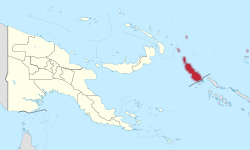
Back Bougainville (Provinz) ALS منطقة بوغانفيل ذاتية الحكم Arabic Bugenvil muxtar ərazisi Azerbaijani Awtonomong Rehiyon kan Bougainville BCL Автономен регион Бугенвил Bulgarian বুগেনভিল স্বায়ত্তশাসিত অঞ্চল Bengali/Bangla Rannvro emren Bougainville Breton Regió Autònoma de Bougainville Catalan Bougainville (lalawigan) CEB Autonomní území Bougainville Czech
Bougainville Bogenvil | |
|---|---|
| Autonomous Region of Bougainville Otonomos Region bilong Bogenvil | |
| Motto: "Peace, Unity, Prosperity" | |
| Anthem: "My Bougainville"[1] | |
 Location within Papua New Guinea | |
| Country | Papua New Guinea |
| Autonomy | 25 June 2002 |
| Voted for independence | 7 December 2019 |
| Capital | Buka 6°0′S 155°0′E / 6.000°S 155.000°E |
| Largest city | Arawa |
| Official languages | English, Tok Pisin |
| Demonym(s) | Bougainvillean |
| Government | |
| Ishmael Toroama | |
| Patrick Nisira | |
| Legislature | House of Representatives |
| Area | |
• Total | 9,384 km2 (3,623 sq mi) |
| Population | |
• 2019 estimate | ≈300,000 |
• Density | 26.5/km2 (68.6/sq mi) |
| HDI (2019) | medium |
| Currency | Papua New Guinean kina (PGK) |
| Time zone | UTC+11:00 (Bougainville Standard Time) |
| Driving side | left |
| Calling code | +675 |
| ISO 3166 code | PG-NSB |
Bougainville (/ˈboʊɡənvɪl/ BOH-gən-vil;[3] Tok Pisin: Bogenvil[4][5]), officially the Autonomous Region of Bougainville[6] (Tok Pisin: Otonomos Region bilong Bogenvil), is an autonomous region in Papua New Guinea. The largest island is Bougainville Island, while the region also includes Buka Island and a number of outlying islands and atolls. The current capital is Buka, situated on Buka Island.
In 2011, the region had an estimated population of 250,000. The lingua franca of Bougainville is Tok Pisin, while a variety of Austronesian and non-Austronesian languages are also spoken. The region includes several Polynesian outliers where Polynesian languages are spoken. Geographically the islands of Bougainville and Buka form part of the Solomon Islands archipelago, but are politically separate from the independent country of Solomon Islands. Historically, Bougainville and Buka, together with the islands of Choiseul, Santa Isabel, the Shortlands and Ontong Java, which are all now part of the country of Solomon Islands, formed the German Solomon Islands Protectorate, the geographical area later being referred to as the North Solomon Islands.
Bougainville has been inhabited by humans for at least 29,000 years. During the colonial period the region was occupied and administered by the Germans, Australians, Japanese, and Americans for various periods. The name of the region originates from French admiral Louis Antoine de Bougainville,[7] who reached it in 1768.
Bougainvillean separatism dates to the 1960s, and the Republic of the North Solomons was declared shortly before the independence of Papua New Guinea in 1975; it was subsumed into Papua New Guinea the following year. Conflict over the Panguna mine became the primary trigger for the Bougainville Civil War (1988–1998), which resulted in the deaths of up to 20,000 people. A peace agreement resulted in the creation of the Autonomous Bougainville Government.
In late 2019, a non-binding independence referendum was held with 98% voting for independence rather than continued autonomy within Papua New Guinea. As a result, the regional authorities intend to become independent between 2025 and 2027, pending ratification by the Papua New Guinean government. If ratified, the capital may relocate from Buka back to the previous location of Arawa.[8][9][10]
- ^ "AUTONOMOUS REGION OF BOUGAINVILLE: Bougainville Flag, Emblem and Anthem (Protection) Bill 2018" (PDF). Abg.gov.pg. Retrieved 28 June 2019.
- ^ "Sub-national HDI - Area Database - Global Data Lab". hdi.globaldatalab.org. Retrieved 2020-04-18.
- ^ Archived at Ghostarchive and the Wayback Machine: "Bougainville: a vote for independence". The World. ABC News. 21 November 2019. Retrieved 23 November 2019.
- ^ "Bogenvil". Tok Pisin English Dictionary. Archived from the original on 25 June 2021. Retrieved 4 December 2019.
- ^ "K20 milien bilong Bogenvil referendem". Loop PNG. 6 June 2019. Retrieved 4 December 2019.
- ^ "The Constitution of the Autonomous Region of Bougainville" (PDF). abg.gov.pg/key-documents. Autonomous Bougainville Government. p. 28, S41.
- ^ Dunmore, John (2005-03-01). Storms and Dreams: Louis de Bougainville: Soldier, Navigator, Statesmen. Exisle Publishing. ISBN 978-1-77559-236-5.
- ^ "Bougainville sets 2027 deadline for independence from Papua New Guinea". France 24. 2021-07-06. Retrieved 2021-07-07.
- ^ "PNG, B'ville agree on latter's independence". Post Courier. 2021-07-07. Retrieved 2021-07-07.
- ^ Mckenna, Kylie; Ariku, Emelda (19 November 2021). "Bougainville independence: recalling promises of international help". The Interpreter. Archived from the original on 18 November 2021. Retrieved 3 December 2021.
